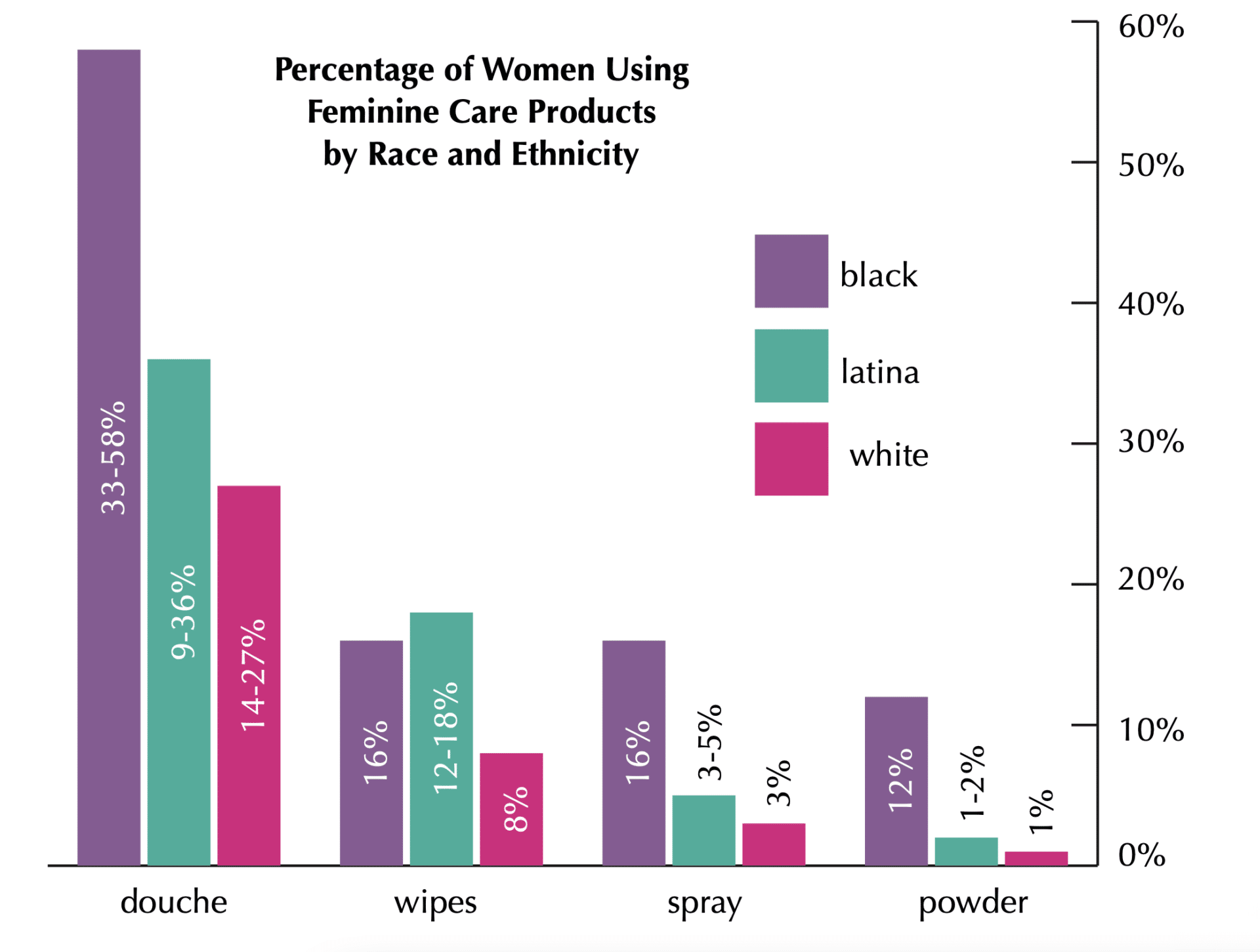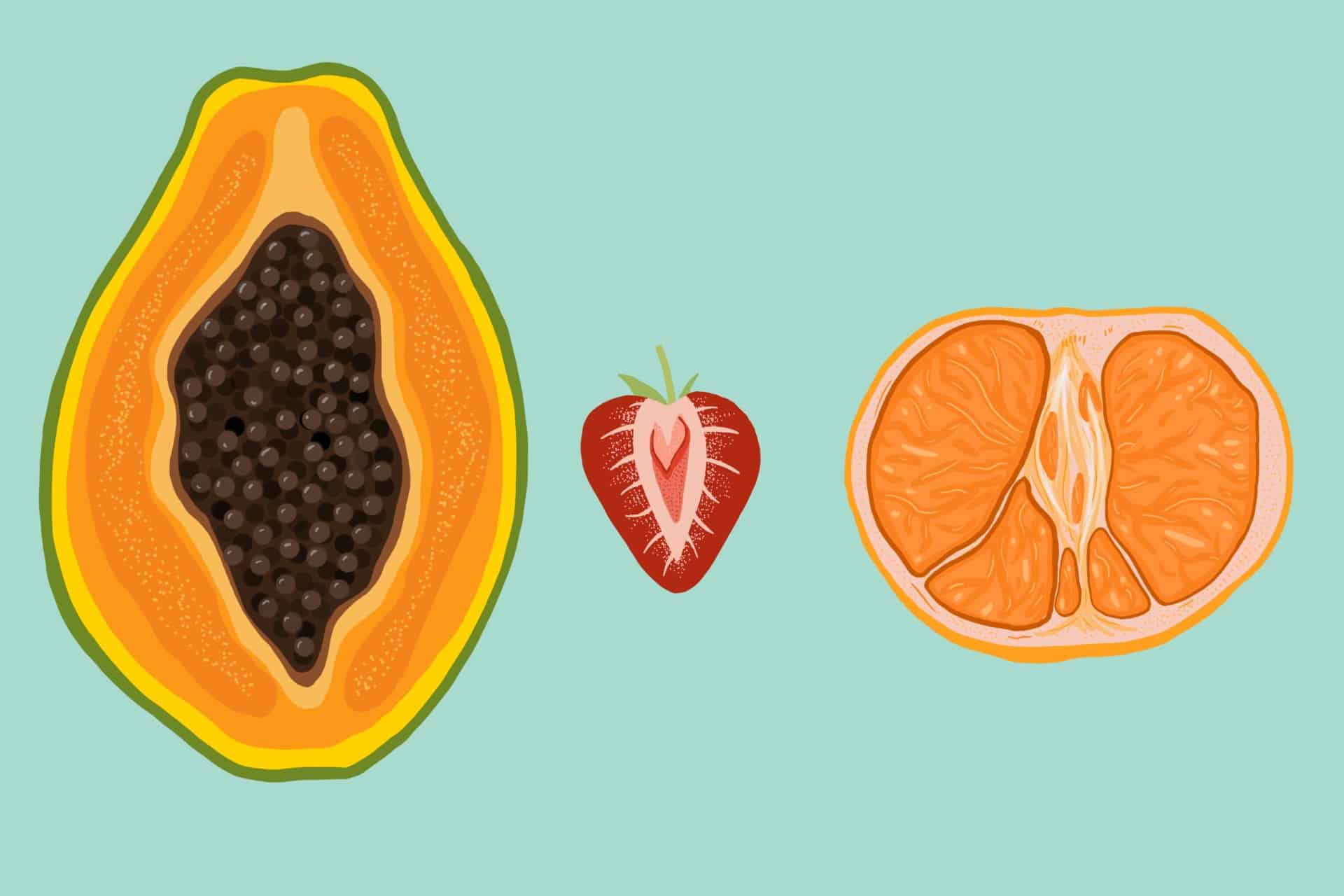//Illustration by Madison Lauterbach | [email protected]
Misogynist marketing tactics are not as passé as many believe them to be. In 2020, Vagisil launched a feminine wash line for teens to help them “feel fresh during their period,” a move that received online backlash for capitalizing on young girls’ insecurities.
In the United States, consumers spend over $2 billion a year on vaginal cleansing products like wipes, washes and douches. Recent studies show harmful chemicals found in these intimate care products are linked to serious health risks including bacterial vaginosis, pelvic inflammatory disease and an increased chance of contracting sexually transmitted infections. Yet, experts say the current data doesn’t even scratch the surface of what is a widely ignored female health epidemic.
“There’s an overall assumption that the ingredients that get used are just fine for our health; people have been using these products for a long time, everybody must be fine,” said Alexandra Scranton, director of science and research at Women’s Voices for the Earth. “I think what doesn’t get acknowledged is there is a lot of unexplained diseases, particularly reproductive concerns, unexplained infertility, unexplained birth defects, and we don’t know what’s causing them. We think the products we’re exposed to every day might be playing a role.”
The vaginal microbiome defends against pathogens and influences reproductive success and disruptions to that ecosystem can cause severe consequences. Despite their popularity, medical professionals have denounced vaginal cleansers as unnecessary because the vagina is a self-cleaning organ.
The historical perception that the female genitalia is unclean has contributed to a vaginal cleansing product industry boom, profiting off of people’s insecurities. Currently, there is no accountability on companies to disclose the ingredients used in their intimate care products, even with some containing phthalates and other hazardous chemicals.
Activists are pushing for the Robin Danielson Feminine Hygiene Product Safety Act of 2019, which directs the National Institute of Health to research the impact that ingredients in feminine care products may be having on female health. Deodorizing sprays, powders, washes, non-medicated douches and most wipes are categorized as cosmetics by the FDA. Under current law, the FDA does not approve cosmetics or require testing to determine their safety. Some feminine hygiene products, especially those with colorants, are labeled “for external use only,” which can be confusing to the consumer. It’s also unlikely that if someone uses these products near their vaginal opening that it does not come in contact with the mucous membrane.
“There are enormous numbers of women being affected by these vaginal issues, but it’s not talked about publicly because our society doesn’t do that,” Scranton said. “Clearly we don’t have good solutions medically because we haven’t invested in better understanding women’s health and what we need to do to make these situations better.”
In her Chem Fatale report, Scranton not only uncovered the toxic ingredients present in feminine care products, but the disproportionate use and chemical exposure among Black and Latina females.

Dr. Tracey Woodruff found similar data in her research for Environmental Health on racial and ethnic disparities in chemical exposure from vaginal douching. She says that to dismantle this inequity in health, governmental regulation is key.
“I think that there’s a layer of this that’s about marketing products to women even if they don’t need those products, and there’s also an element that has a racist past in terms of the use of douching as a way to denote cleanliness,” Woodruff said.
Dr. Ami Zota, co-author of the Environmental Health study, echoed this sentiment in a Vaginal Health Panel hosted by Women’s Voices for the Earth in May.
“The use of these intimate care products, like douching, drive the racial disparities we see in environmental exposures,” Zota said. She later added, “Factors like structural racism and sexism affect health. There’s less conversation about how these systems of power and oppression impact our product use and our beauty norms.”
Isabelle Chaudry, the National Women’s Health Network’s senior policy manager, used the Johnson & Johnson talcum powder lawsuit as an example of the consequences of false advertising, especially for communities of color. After being accused of marketing the powder to Black women despite warnings of its carcinogenic properties, Johnson & Johnson was ordered to pay $2.1 billion to a group of women who developed ovarian cancer, six of which died before the trial started.
“Certain beauty standards have been shaped over time through racist advertising and commercial marketing to perpetuate false ideas about Black and brown people,” Chaudry said. “Myths and stereotypes have been perpetuated to these communities. False ideas about being unclean and having certain odors have been perpetuated. The industry has always capitalized off of this, tapping into Black and brown women’s insecurities regarding beauty, thereby influencing consumer choices.”
So what should be used to clean a vulva and vagina? Warm water, not products, should do the trick. If you notice odors or discharge that’s strange to you, contact your doctor or a medical professional.
However, it’s essential to note douching is not dangerous for all women. In fact, for some, it is recommended.
The vagina of a cis woman functions as its own organ while a neovagina of a trans woman is made from tissue that is repurposed into the space below the urethra. This difference calls for a temporarily altered hygienic routine.
Dr. Jennifer Hyer performs gender-affirming surgery at Denver Health. She said trans women are instructed to use vaginal douches post-operation until the neovaginal space is healed. She recommends a remedy of distilled vinegar and water rather than commercial products.
“If you were to ask me [if] there is a feminine hygiene product that I would recommend for a person to use, my answer would be no,” Hyer said. “I don’t think that these products, in general, have any value and I also think they can actually cause harm, not only physically, but psychologically, socially for women to see these products and think, ‘Do I have an odor? Am I not doing something correctly? Should I be using this so I’m like a ‘normal’ woman?’”
Hyer says people’s bodies already have what they need to be healthy. False advertising perpetuates the ideology that something is inherently wrong. However, she believes people should speak about vaginal concerns and questions with their healthcare provider but understands those without access to healthcare can more easily fall prey to these marketing tactics.
“As a person with a vagina, educate yourself about your vagina,” she said. “Learn your body, don’t be ashamed of your body.”
Enjoyed this story? Help us keep the lights on! Supporting local press ensures the stories you want to read keep coming, become a member for free today! Click here.





0 Comments